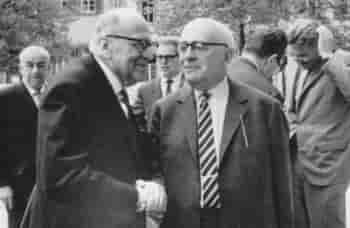This seminar will introduce students to early Frankfurt School Critical Theory and its subsequent developments. While a comprehensive overview is impossible in just one semester, we will cover a mixture of canonical and less well-known topics relevant for the contemporary debates in critical theory. The seminar will focus four core aspects:
- We will begin with the most famous inaugural texts by Max Horkheimer and Theodor W. Adorno in which they set out the shape and ambition of critical theory in the 1930s and 1940s.
- Since critical theory aims to intertwine philosophy and the social sciences, we will investigate a few topics and concepts particularly important to critical theory’s interdisciplinary social theory and the resulting critical diagnosis, especially authority, ideology, and emancipation.
- We will discuss more recent developments of Frankfurt School Critical Theory since the 1970s, in particular the communicative turn advanced by Jürgen Habermas and the theory of recognition put forward by Axel Honneth. In addition, we will briefly look at the work of some contemporary representatives of Frankfurt School critical theory like Rahel Jaeggi, Robin Celikates or Nancy Fraser.
- In the last weeks of the seminar, we will turn to the topics of authoritarianism, right-wing extremism and fascism to explore the relevance of critical theory for today.
Allgemeine Literatur zur Vorbereitung
Adorno, Theodor W. (2020): Aspects of the New Right-Wing Extremism. Translated by Wieland Hoban. Cambridge: Polity.
Bronner, Stephen Eric (2017): Critical Theory: A Very Short Introduction. 2nd ed. Oxford: Oxford University Press.
Fraser, Nancy and Rahel Jaeggi (2018): Capitalism. A Conversation in Critical Theory. Ed. by Brian Milstein. Cambridge/Medford, MA: Polity.
Habermas, Jürgen (2024): »Es musste etwas besser werden …« Gespräche mit Stefan Müller-Doohm und Roman Yos. Berlin: Suhrkamp.
Horkheimer, Max (2002 [1937]): Traditional and Critical Theory. In: idem., Critical Theory. Selected Essays. New York: The Continuum Publishing Company, 188–243.
Voraussetzungen
Das Seminar richtet sich an Studierende ohne weitere Vorkenntnisse. Allerdings erfordert das Lesen und Verstehen der Texte Geduld und Anstrengung. Ein schneller Erfolg ist nicht garantiert, wohl aber ein nachhaltiger Verlust der Naivität - Erleuchtung und teilweise Emanzipation durch Theorie könnten folgen.
Leistungsnachweise
Bitte sehen Sie in den Seminarplan, sobald dieser verfügbar ist.
